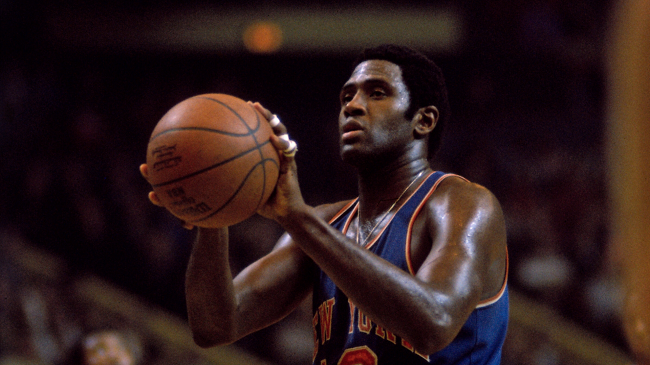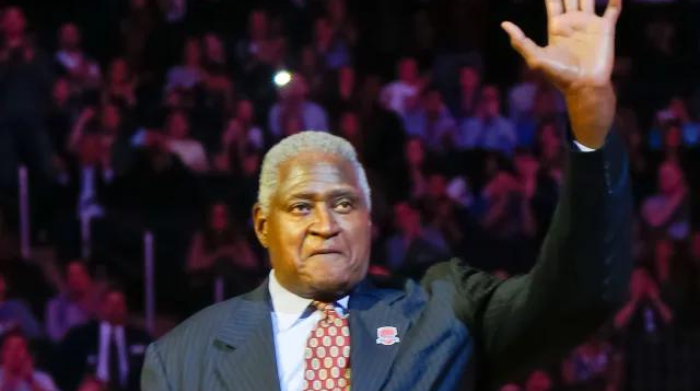Willis Reed, the player who emerged from the locker room some minutes before Game 7 of the 1970 NBA Finals to give the New York Knicks their first championship and deliver one of the most inspiring examples of playing through pain, died on Tuesday at the age of 80.
The National Basketball Retired Players Association announced Reed’s death, which was later confirmed by his family. The cause of death was not released, but Reed had been sick recently and could not travel to New York for the Knicks’ celebration of the 50th anniversary of their 1973 NBA championship team during their game against New Orleans on February 25th.
Read: LeBron James increases stake in Liverpool owners FSG following ‘lifetime deal’ after Nike agreement
New York posted a photograph of Reed walking onto the court as his teammates warmed up for the 1970 finale, one of the most memorable moments the NBA and Madison Square Garden have ever witnessed.
“As we mourn, we will always strive to uphold the standards he left behind — the unmatched leadership, sacrifice and work ethic that personified him as a champion among champions,” the New York Knicks wrote. “His is a legacy that will live forever.”
Dubbed “The Captain’’, Reed played the role of a centre and emotional leader during the Knicks’ two NBA championship teams, he had a soft shooting touch from the outside and a toughness to tussle with the era’s superstar big men on the inside.
He was remembered at his death, maybe for the way he captained the Knicks more than how he played for them.
“Willis Reed was the ultimate team player and consummate leader. My earliest and fondest memories of NBA basketball are of watching Willis, who embodied the winning spirit that defined the New York Knicks championship teams in the early 1970s,” NBA Commissioner Adam Silver said. “He played the game with remarkable passion and determination, and his inspiring comeback in Game 7 of the 1970 NBA Finals remains one of the most iconic moments in all of the sports.”
Willis Reed’s achievements – seven All-Star selections, and two NBA Finals MVP awards amongst others, would have gotten him a Hall of Fame induction. In the 1969-70 season, Reed became the first player to gather the MVP awards for the regular season, All-Star Game and NBA Finals.
Related: Milwaukee Bucks defeat Phoenix Suns to become first team in play-off place
However, this legend secured his place in history by merely walking onto the floor on the final night of the season.

Reed injured a thigh muscle in Game 5 of the series between the Knicks and Los Angeles Lakers, stumbling out on the court in pain. He sat out Game 6 as Wilt Chamberlain had 45 points and 27 rebounds in a Lakers’ spree that caused a deciding game at Madison Square Garden.
His Knicks teammates didn’t know his status as he was still getting treatment shortly before Game 7. The Lakers and Knicks were warming up when Reed showed up, fans rose and roared when they saw him coming out of the tunnel leading to the locker room.
“And here comes Willis and the crowd is going wild,” radio announcer Marv Albert said.
Los Angeles stopped to watch Reed, who did two quick jump shots in the early minutes of the game and ran back down the court with a noticeable limp after two of them. He would not score again, but the Knicks did not need him to. With their captain coming back and Walt Frazier’s 36 points and 19 assists spurring them to a 113-99 romp and their first NBA title.
Frazier for his team delivered one of the most impressive performances ever in a deciding game, but it remains a footnote to Reed’s return. In 2006, in line with the NBA’s 60th anniversary, it finished third in voting for the league’s 60 greatest playoff moments, after Michael Jordan’s championship-winning jumper for his sixth title in 1998 and Magic Johnson ending his rookie season by stepping in for Kareem Abdul-Jabbar at centre in Game 6 of the 1980 finals to lead the Lakers to a championship.
In subsequent moments, what Reed did at Game 7 during Knicks VS Lakers, became a point of reference sometimes when a player came back from injury. One instance is when the Boston Celtics’ Paul Pierce was lifted off the floor with a knee injury in Game 1 of the 2008 NBA Finals against Los Angeles before returning. But Phil Jackson, Reed’s teammate and then Lakers coach has dismissed that comparison because of the severity of Reed’s injury.
“If I’m not mistaken, I think Willis Reed missed a whole half and three-quarters almost of a game and literally had to have a shot — a horse shot, three or four of them — in his thigh to come back out and play,” Jackson said.
Reed could not recover that fast from injuries in the years to come. He was restricted to only 11 games in 1971-22 but came back stronger the next season to lead the Knicks to their second title in what was the last full season he played.
Although his comeback made the ‘70 title the more celebrated one, it was the ‘72-73 squad, who were fortified by Hall of Famers Earl Monroe and Jerry Lucas that stood out to Reed.
“That, to me, in my mind was the best team,” he said during its 40th-anniversary celebration.
Willis Reed will go on to play 19 more games in 1973-74 before retiring due to a knee injury after only 10 seasons.
This 10 season was enough time for The Captain to collect over 12,000 points and 8,400 rebounds, two of which still rank top three on the Knicks’ career lists.
Reed had a successful post-playing career as a coach and executive with 76ers coach Doc Rivers remember playing for the Atlanta Hawks when Reed was an assistant coach.
“He was simply a great person, A man!!! A leader!!! A Winner!!!” Rivers tweeted.
Willis Reed was born June 25, 1942, in Hico, Louisiana. He was in his home state for his college career, leading Grambling State to the 1961 NAIA championship and a third-place finish in 1963. The school retired his number and named its court after Reed in 2022.
As a second-round pick in 1964, he proved immediately that being 6-foot-9 would not stop him from becoming one of the NBA’s top centres. He was voted Rookie of the Year and earned the first of his seven straight All-Star selections.
Reed played a huge role in driving the New York Knicks to become one of the best teams in the NBA, alongside Hall of Famers like Frazier, Bill Bradley, and Dave DeBusschere.
He contributed 18.7 points and 12.9 rebounds for his career, including a lot of toughness. In 2014, a documentary by ESPN on those Knicks showed a clip of a 1966 fight in a game against the Lakers, where Reed threw punches at multiple opponents, with Jackson noting that Reed seemed to “decimated this team.’’
Reed’s No.19 was the first number retired by the Knicks and in 1982 he was inducted into the Naismith Memorial Hall of Fame.
He went on to coach the Knicks to a playoff berth in 1977-78 but coached them 14 more games the next season. He was also a head coach at Creighton and the New Jersey Nets, but his greatest success after his career as a player came in the front office.
He was the senior vice president of basketball operations when they drafted Derrick Coleman and Kenny Anderson, who became All-Stars, leading the Brooklyn Nets to the playoffs in the 1990s.
Related News:
Ja Morant suspended for 8 games without pay for detrimental conduct to league




Leave Your Comment Here